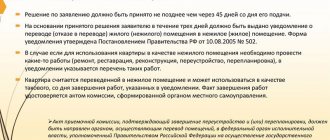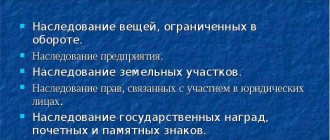Types of inheritance
The Civil Code of the Russian Federation provides for two types of inheritance: by law and by will. In the first case, the property is inherited by the closest relatives of the deceased in the absence of a will; in the second, the heir can be any individual or legal entity, as well as the state. Each type of inheritance has its own characteristics; let’s consider the most significant of them.
Inheritance by law
Inheritance by law provides for the transfer of the testator's property to all inherited relatives, who by law are divided into several lines. Today, on the territory of the Russian Federation, there are eight main lines of heirs by law, these are:
- parents, spouses and children (as well as grandchildren/their descendants by right of representation - heirs of the first priority);
- sisters and brothers, grandparents, nieces and nephews - heirs of the second stage;
- aunts and uncles, cousins and brothers - heirs of the third stage;
- great-grandparents - heirs of the fourth stage;
- children, nieces and nephews, sisters and brothers of grandparents - heirs of the fifth stage;
- cousins and uncles, grandchildren and children of nephews and sisters/brothers - heirs of the sixth stage;
- stepdaughters and stepsons, stepmother and stepfather - heirs of the seventh line;
- The eighth priority consists of heirs who are disabled persons, who were dependent on the testator for at least one year before the death of the testator and who live together with him, and who are not included in the first seven priority groups.
All property inherited by law is divided equally between the heirs of the corresponding line, and one can become an heir of each line on the conditions that the heirs of the previous line did not accept the inheritance, refused it, lost the right to it, or are absent.
In addition, in Russia they inherit by rights of representation if the heir by law dies before the testator, or at the same time as him, then his descendants have the opportunity to inherit the property of the deceased relative.
Inheritance by will
According to the norms of Russian legislation, the right to bequeath property for a citizen is an element of legal capacity. The testator has the full right to dispose of any of his property in the event of his death by drawing up the necessary document, including disinheriting one or more heirs by law.
A will can only be drawn up in writing, it must be certified by a notary, or in special cases, appropriate certification of the document by an official is allowed, for example, if the testator is in a medical institution, then the chief doctor, in a military unit - the commander of the unit, etc. Failure to comply with this requirement results in the will being declared invalid. The only exception can be the basis presented in Art. 1129 of the Civil Code of the Russian Federation, when there are extraordinary circumstances that pose a clear threat to a person’s life, in this case it is allowed to draw up a will in simple written form, in the presence of two witnesses.
Heirs under a will can be individuals, private companies, the state and even international organizations. The testator has the right to cancel, amend or supplement his will at any time without the obligation to indicate a reason for this action.
The relationship between the concepts of “disability” and “dependency” in inheritance law
The types and types of inheritance under consideration involve concepts such as “disability” and “dependency,” which at first glance seem similar, but have significant differences.
Disability occurs due to reaching a certain age:
- 55 years for women;
- 60 years for men.
In addition, it is present in citizens under 16 years of age (students under 18 years of age). Disability can also be caused by health conditions (disabled people of groups I, II or III).
If one of the above grounds is present, it does not matter whether the citizen is assigned a pension or does not have one. It is important to note that the types of inheritance that briefly characterize the categories of possible heirs do not include disabled people: pensioners who received such status through service, for example, employees of the Department of Internal Affairs, the Federal Penitentiary Service, miners, dancers, and so on. On the other hand, working after reaching retirement age does not deprive a person of the status of a disabled person.
Who can be the heir
Legal heirs can be individuals who are alive on the day the inheritance is opened, or who were conceived during the life of the testator and born after the opening of the inheritance. Also, the state may be called upon to inherit an inheritance if the inheritance is recognized as escheatable property.
In addition to individuals, legal entities, municipalities, states, including foreign and international organizations can also be involved in inheritance under a will.
Content of the phenomenon
The basis of inheritance is the legal and factual rights and obligations of all parties involved in the matter.
If the testator is alive, the heirs have no rights. They cannot make any demands at this time. Only after the opening of an inheritance can we speak of the emergence of hereditary relations. The testator always has the right to use the powers of the will or leave everything as is. After the death of the testator, certain persons are transformed into heirs who are required to make the following decisions:
- accept inheritance;
- refuse him.
Video about what it means to “accept an inheritance”:
In turn, officials (notaries) have an obligation to help a person accept an inheritance or refuse it.
Important! After going through the procedure of accepting an inheritance in a legal sense, the heir becomes the owner. This means that in addition to property rights, the heir will also bear all associated debts/responsibilities.
Deadlines in inheritance
The inheritance opens with the death of the testator; the day of opening is the day of the citizen’s death. When the testator is declared deceased by the court, the day of opening of the inheritance is the day the court decision enters into legal force.
A citizen must enter into inheritance rights within 6 months from the date of opening of the inheritance; at the end of this period, the heir loses the right to receive the inheritance, except in cases where he can voice a valid reason for non-compliance with the legal deadlines for entering into the inheritance, then the court can restore the deadline inheritance of property.
It is also worth noting that the place of opening of the inheritance is the immediate last place of residence of the deceased; if it is unknown or is located outside the territory of the Russian Federation, then the place of opening of the inheritance is considered to be the location of the inherited property.
The contenders - who are they?
In some cases, the list of those who can claim an inheritance includes not only those individuals who have a legal basis for this. That is, can those who are not included in the will and are not among the persons entitled to receive the property base without fail claim their share?
For example, so-called “common-law spouses” often become applicants. Legally, such a concept is not valid. Based on the letter of the law, civil spouses are all couples who entered into a union in the registry office, but did not enter into a church marriage. However, at the moment, cohabitants are becoming frequent claimants to inheritance. Today, such couples sometimes live without registering their relationship for decades, amassing a joint property mass.
In the absence of a will, cohabitants can receive their share of the inheritance by proving that they were dependent on the testator. To do this, you will need to confirm the fact of cohabitation for at least 12 months and document the receipt of significant financial support from the testator. The presence of the cohabitant’s own salary or pension is not taken into account in this case.
The so-called actual marital relations, which cohabitants often try to refer to, are not taken into account. The only exception is the willingness to confirm the fact of the beginning of the actual marriage relationship before July 8, 1944 . On this day, the confirmation of unions in the registry offices was officially recorded by law.
You can return the funds that were spent on acquiring property during the years of cohabitation by providing checks for purchases purchased with the wife’s funds or purchased jointly, as indicated on the check.
Inheritance procedure in Russia
Russian legislation provides for two ways to accept inherited property:
- the heir submits an application for acceptance of the inheritance to a notary;
- carrying out certain actions that may indicate the actual acceptance of the inheritance: payment of expenses for maintaining the property from one’s own funds; taking measures to preserve property; taking possession of property and other actions provided for in paragraph 2 of Art. 1153 of the Civil Code of the Russian Federation.
Thus, the law makes it possible to become the actual heir of the property of the deceased, excluding the established procedure for inheritance, which entails the heir applying to a notary’s office. However, it should be borne in mind that the fact of acceptance of the inheritance will need to be established in court.
If the inheritance by law or will passes to two or more heirs, the property comes into common shared ownership from the date of opening of the inheritance, after which it can be divided by mutual agreement of the parties or the shares of the heirs can be determined by court claims.
Procedure for notarization of a will
The special procedure for certifying a will by a notary is characterized by the following features:
- One of the duties of a noatrice is to establish the identity of the testator after viewing his documents (passport, driver’s or service license), and verify the person’s legal capacity.
- During the certification procedure, the provisions of the law on compulsory share must be explained to the testator, about which a note is made in the will.
- The completed will is signed by the testator under the supervision of a notary, after it has been read aloud to him.
- A notary has no right to sign a will that contains crossed out words, blots, corrections, additions, as well as documents written and signed in pencil. All names mentioned in the text must be written in words, without any abbreviations.
- The notary does not certify wills drawn up in his name.
What else you need to know about inheritance in the Russian Federation
1. Unworthy heirs. In the field of inheritance, legislation establishes such a concept as “unworthy heirs”:
- persons who, by deliberate actions against the testator or his heirs, contributed to the recognition of themselves or other persons as heirs of the property of the deceased;
- parents who were deprived of parental rights and restored to these rights by the day the inheritance was opened;
- persons who maliciously evade fulfillment of obligations to support the testator assigned to them by law.
2. Mandatory share in the inheritance. When drawing up a will, the law obliges the testator to allocate a mandatory share to his minor or disabled children, disabled spouse or parents, as well as disabled dependents (Article 1149 of the Civil Code of the Russian Federation). Even if these norms of the law are not observed, this category of heirs, regardless of the will, inherits at least ½ share of the property that would be due to them if inherited by law. A will that infringes on the rights and interests of legal heirs can be challenged in court.
3. The heirs are liable for the debts of the testator. In accordance with Art. 1175 of the Civil Code of the Russian Federation, each heir is liable for the debts of the testator within the limits of the value of the share transferred to him in the property by inheritance.
4. Escheatable property. If there is inherited property that for any reason cannot be inherited by law or by will (lack of heirs, refusal of inheritance, etc.), this property is recognized as escheat and transferred into ownership of the state, while real estate can be transferred owned by a city or municipality.
Mandatory share of inheritance
A mandatory share of the inheritance is given to children under the age of majority. Along with them, disabled dependents who have been supported by the testator for 1 year when living together or even separately are certainly included in the inheritance queue, regardless of the degree of relationship and form of inheritance. Disabled people who are supported by the testator and who live with him for more than 12 months are inevitably included in the line of inheritance together with relatives, and also receive the right to inherit in the absence of direct relatives.
The amount of the obligatory share is determined at 50% of the total amount or even more. The right of minors and dependents is protected by law, which does not allow its redirection to other persons. If the copyright holder does not want to use it and formally formalizes the refusal, he will not have the opportunity to change his intentions legally.
In addition to the property of the testator, the heirs also receive his debt liability, the extent of which depends on the total value of the estate.








